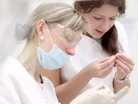Experts Propose Sweeping Changes to Medical Education System to Meet Health Needs

A panel of experts recommended Tuesday, July 30 reexamining government health funding, saying the current $15 billion graduate medical education system is no longer proving effective.
“We recognize we are recommending substantial change,” said health economist and former Medicare Administrator Gail Wilenskym, co-chairwoman of the nonpartisan Institute of Medicine, in a news release. “We think it’s key to justifying the continued use of public funds.”
American taxpayers have helped support physician education for generations, and the nation’s teaching hospitals have been integral to the production of preparing a physician workforce. According to the report, newly trained physicians entering today’s workforce have “strong scientific underpinnings in the biological and physical sciences as well as supervised practical experience.”
Primarily though the Medicare program, the federal government provides more than $11 billion per year to the hospitals that sponsor interns and residents to support the training of doctors who have recently graduated from medical school. An additional $4 billion is generated through the Medicaid program.
“The scale of government support for this phase of physician education is unlike that of given to any other profession in the nation,” said the report.
But despite a growing public investment in graduate medical education, the report found that there are persistent problems with geographic maldistribution of physicians, a mismatch between health needs and physician specialty make-up, and a lack of cultural diversity in the health care workforce.
Additionally, recently trained physicians cannot perform simple tasks required in office-based practice due to a lack of training and experience.
To improve this, the committee proposes a sweeping overhaul of the entire financing program for graduate medical education, with the goal of shifting the program to a “performance-based system.”
The panel recommends that funding from Medicare should remain consistent across the board over the decade, adjusted for inflation. The way said funding is distributed, however, should be changed, with a declining share providing direct subsidies to teaching programs. An increasing share would finance new ways to provide and pay for training.
The funds would continue to be distributed through the Medicare program, but a new “GME (graduate medical education) Policy Council” would be created under the office of the Secretary of Health and Human Services.
Those most immediately affected would include major teaching hospitals in the Northeast, which currently account for a disproportionate amount of Medicare medical education funding, Kaiser Health News reported.
The Association of American Medical Colleges was critical of the report, telling Kaiser Health News that the recommendations would “threaten the world’s best training programs for health professionals and jeopardize patients.”
“By proposing as much as a 35 percent reduction in payments to teaching hospitals, the [Institute Of Medicine]’s recommendations will slash funding for vital care and services available almost exclusively at teaching hospitals, including Level 1 trauma centers, pediatric intensive care units, burn centers, and access to clinical trials,” AAMC President Darrell G. Kirch said. “In addition to hurting patient care, these cuts will limit critical training settings for future physicians, nurses, and other health professionals.”
According to Wilensky, the rapid evolution of the health care sector “was an important rationale for potentially using the leverage provided by government funding to try to train the health care workforce we needed for a 21st century delivery system.”
Increasing the number of physicians, however, won’t likely solve the current workforce issues, he added.
- Healthcare providers: The route to digital transformation successTechnology & AI
- Stryker appoints a new head for its India operationsTechnology & AI
- Baylor Scott & White Health and Memorial Hermann Health System are set to mergeDigital Healthcare
- Pfizer’s announces new CEOTeleHealth & COVID-19



